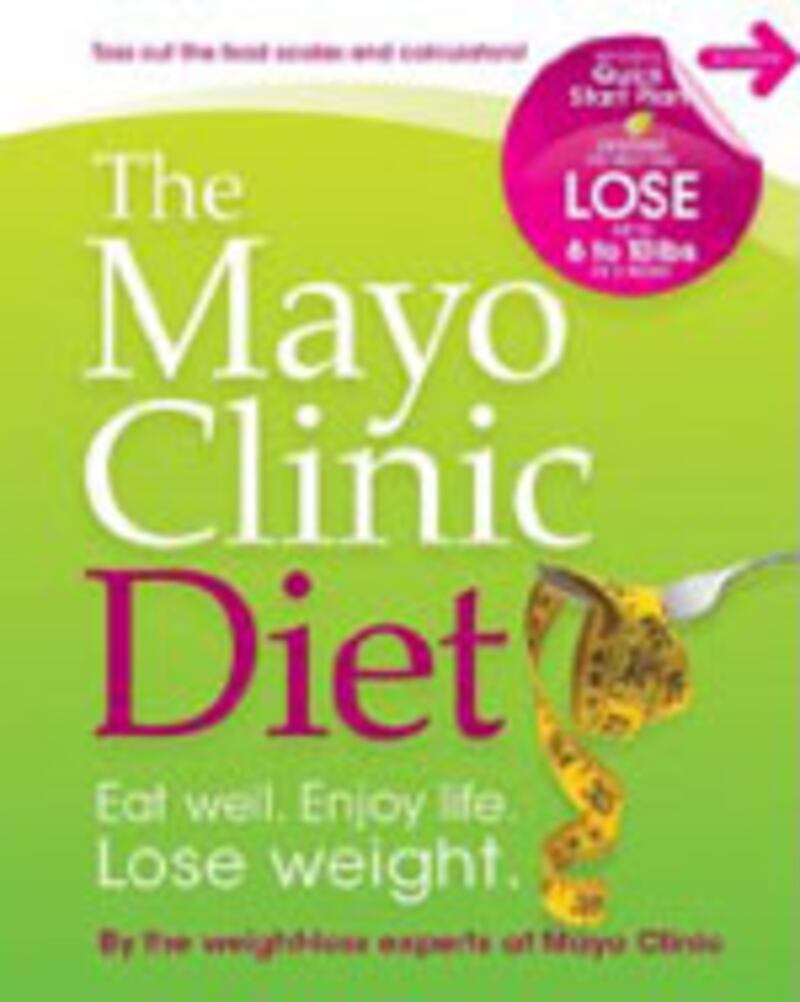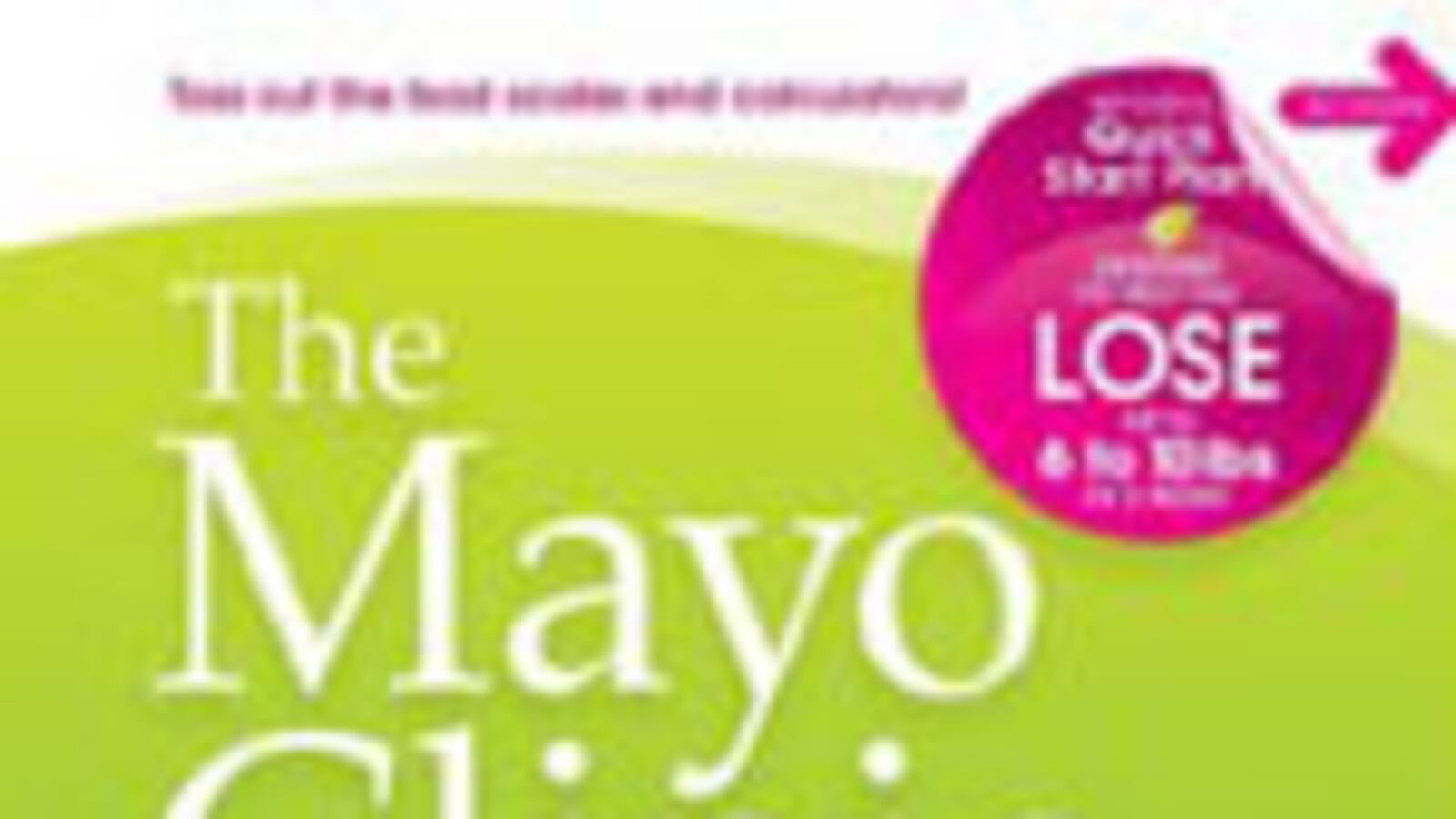
Book: The Mayo Clinic Diet Authors: The weight-loss experts at the Mayo Clinic Pages: 254 Readable pages: 254 Sample line: “Carbohydrates, fats, protein…oh my!”
Listen up, fatso: The Mayo Clinic Diet is the best-selling diet book in America. It’s not because of the weight-loss prescriptions, which are rather obvious (“eat a healthy breakfast”). It’s because of the book’s writing, the happiness-enriched prose that can make even the girthiest among us feel like a swimsuit model. It’s the feel-good book of the year.
“This diet is not a fad,” writes the Mayo Clinic’s Dr. Donald Hensrud, a handsome, Charlie Crist-looking figure. What Hensrud and his team want is to make your diet as unobtrusive as possible. There will be no humiliations as in NBC’s The Biggest Loser. The Mayoites urge you to “find your eating place”—the part of house you’d like to diet in. “The cool thing about burning calories,” they write, “is that the possibilities are almost endless.”
In an introductory lesson, the Mayoites suggest that you, the dieter, try to estimate half a cup of dry cereal—the point being that you’re probably eating more food than you think. Now, I know of no one, outside of a Kellogg’s executive, who would feel threatened by the outcome of this exercise. But the authors feel moved to add, “If you overestimated, don’t feel discouraged.”
Every diet promises comfort—no calculators, no food scales, etc. But The Mayo Clinic Dietis beatific in the extreme. The authors may work for one of the most cutting-edge medical facilities in the world, but they address the reader as if he or she had never before been in a supermarket. “Common opinions hold that vegetables and fruit don’t have much flavor or that they all taste the same,” they write. Held where, in kindergarten? Elsewhere: “Lettuce or fresh spinach is generally the foundation of a healthy salad.” Still elsewhere: “Keep in mind that you don’t need to like all varieties of vegetables and fruits, just some of them.”
The first section—called “Lose It!”—told me I could lose six to 10 pounds in two weeks. The advice is hearteningly intuitive. I should eat whole grains, fruits, vegetables (not all of them, just some of them). I should exercise 30 minutes a day. I should cut out sugar and snacks, and I shouldn’t eat while I watch TV. Flipping the pages, I kept waiting for the provocative angle, the hook that made The South Beach Diet or Atkins’ New Diet Revolution so memorable. But it never came, nor did any command I couldn’t perform while sitting in the business class section of Virgin Atlantic. The authors later say that this part of the book is “kind of like a boot camp.”
As the book moves from “Lose It!” to “Live It!”—aka, Week 3—a few hard numbers begin to appear. I should lose one to two pounds per week; I should eat 500 to 1,000 fewer calories a day; I should eat one-quarter of the Snickers Bar I find lying around Beast headquarters instead of the whole thing. There is plenty of smart advice: My daily serving of protein, for instance, should be no bigger than the size of a deck of cards.
The author of a diet book must be a gentle psychologist. Anyone who has picked up the thing has done so because they feel bad about themselves, because their vow to run a mile every morning has become a brisk walk to the pastry shop. The Mayo Clinic Diet tries the gentle approach. It’ll cite a “negative attitude” (“Exercise is painful and boring”) and contrast it with a “new attitude” (“I’ll call a friend to go walking and enjoy the beautiful day”). I’m guessing that most of us fall somewhere between clinical depression and unbearable happiness—and even that makes us feel better.
The Mayoites have performed a kind of provocative stunt here: they’ve done nothing provocative. They’ve put some brightly colored jogging shorts on some age-old wisdom. And one more thing: The Mayo Clinic Diet makes a bid to be the official diet of the Obama administration. The book is chock full of helpful hints called “Yes, I Can!” This is a diet for an optimistic age, for those who still believe in the audacity of hope.
Read it? Yes.
Previously reviewed William Boot:
U is for Undertow by Sue Grafton I, Alex Cross by James Patterson The Help by Kathryn Stockett Noah’s Compass by Anne Tyler Committed by Elizabeth Gilbert
Plus: Check out Book Beast, for more news on hot titles and authors and excerpts from the latest books.
William Boot covered the war in Ishmaelia and wrote the Lush Places column for The Daily Beast. He now reviews bestsellers.





